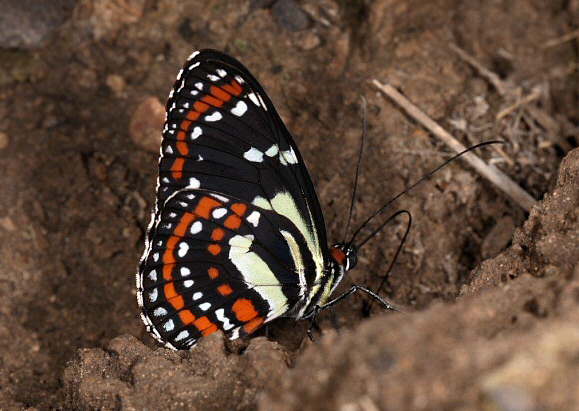
Introduction
The Ithomiini comprises of 376 known species, although it is likely that at least another 30 will be discovered in the near future. All are confined to the neotropical region. Ithomiines are unpalatable to birds, and are consequently mimicked in appearance by many other species. These include other unpalatable species (Müllerian mimics), not only from the Ithomiinae but also from several other butterfly families.
There are also a large number of edible species (Batesian mimics) which have evolved similar patterns. Birds have the ability to memorise butterfly patterns and so learn to avoid eating noxious species, but are also fooled into ignoring similarly marked edible species.
Ithomiines are characterised by having small eyes, slender abdomens and long drooping antennae that lack distinct clubs. Males have a plume of long androconial scales or “hair pencils” on the costa of their hindwings. These are hidden from view when the butterflies are at rest, but are displayed when the wings are held open during courtship. Other Ithomiine characteristics include a very slow and deep wing beat, and a preference for inhabiting the darkest recesses of the forest understorey.
The genus Elzunia consists of just 2 species, humboldt and pavonii. Both are black on the upperside, banded and spotted with white. On the underside humboldt has a singly large reddish-orange patch on the outer part of the hindwing, but pavonii has 2 bands of red-orange spots.
Elzunia pavonii is distributed from Panama to Peru, and is found on both sides of the Andes.
Habitats
This species inhabits rainforest and cloudforest at altitudes between about 400-2000m.
Lifecycle
To be completed.
Adult behaviour
The butterflies are normally encountered singly. They are rather inactive, and fly slowly with deep wing-beats, but can put on a quick turn of speed if disturbed. Males can be found imbibing moisture from damp ground. Females are usually encountered nectaring at the flowers of bushes.
